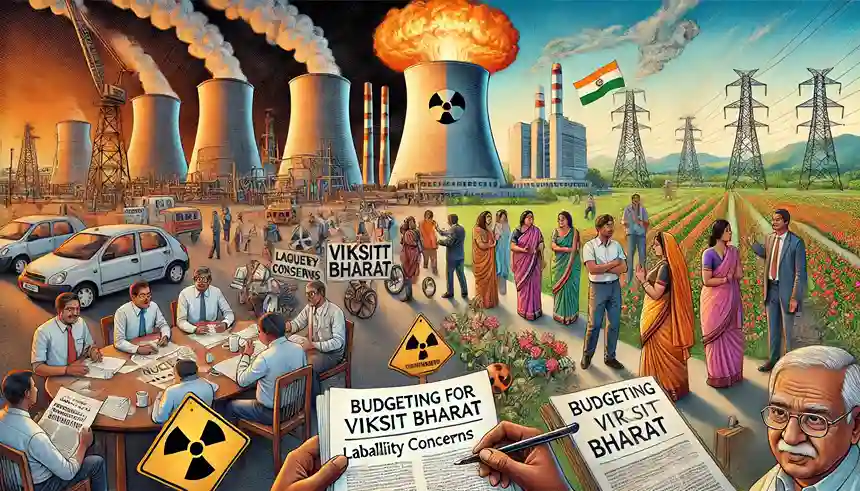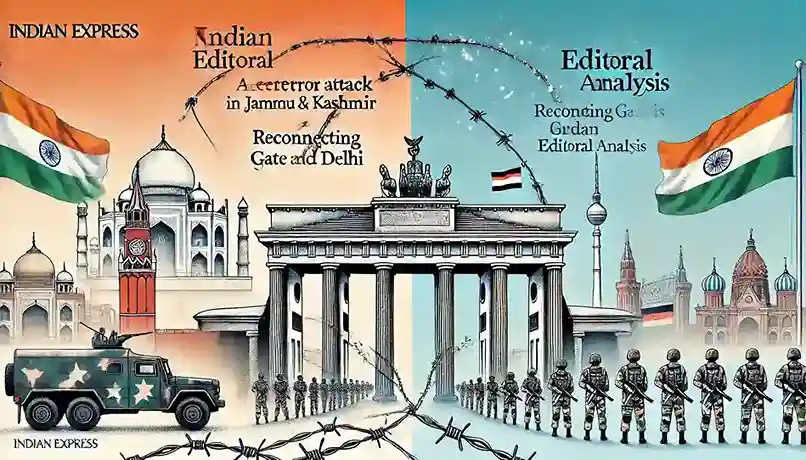Analysis of Indian Express Editorial 1: A Terror Attack, many Signals
Context
A Wake-Up Call: Understanding the Recent Terror Attack in J&K
The Recent Terror Incident
The attack targeting employees working on the Z-Morh tunnel construction project is a stark reminder of the evolving situation in Jammu & Kashmir (J&K). This event isn’t just a localized act of violence but signals a broader and concerning trend. It should be viewed from two key perspectives:
- Revival of Terrorism in J&K: A resurgence of militant activities is evident.
- A Series of Unusual Incidents: Recent occurrences hint at a calculated effort to expose India’s vulnerabilities.
- Analysis of The Hindu Editorial – February 13, 2025

- Analysis of The Hindu Editorial – February 12, 2025

- Analysis of The Hindu Editorial – January 1, 2025

- Analysis of The Hindu Editorial – December 31, 2024

- Analysis of The Hindu Editorial – December 19, 2024

Resurgence of Terrorism in Jammu & Kashmir
The underlying forces behind these attacks seem to be the Pakistani deep state, which appears determined to prevent long-term stability in the region. This intent is particularly pronounced after the successful completion of elections in J&K and the establishment of a new government in Srinagar. Here’s a closer look at the factors at play:
- Desperation to Remain Relevant: The deep state and those backing the proxy war are striving to retain their influence over the J&K narrative.
- Diversionary Violence: Incidents of high-intensity violence in the Jammu region appear to be strategic distractions rather than the main focus.
- Focus on Kashmir: For Pakistan’s deep state, Kashmir remains the core issue. Losing this narrative to India’s focus on development, transparency, and inclusivity would be a significant setback.
- Impact of Article 370 Abrogation: The removal of Article 370 weakened Pakistan’s claims over Kashmir, making it more urgent for them to re-ignite tensions to maintain their narrative.
Strategic Projects in the Crosshairs
Recent attacks indicate a shift towards targeting strategic infrastructure projects, especially those in less secure, remote areas. Terrorist groups see these projects as vulnerable points that could be exploited to disrupt normalcy. Critical infrastructure under threat includes:
| Project | Location | Significance |
|---|---|---|
| Z-Morh Tunnel | Peripheral Area | Flagship project, requires specialized labor |
| Kishanganga Project | Near Line of Control (LoC) | Key to regional power supply |
| Uri 1 and Uri 2 Hydroelectric Projects | Jhelum Valley | Vital for energy security in the region |
| Railway Projects | Around Banihal and Qazigund | Crucial for connectivity and economic development |
These projects symbolize progress and development in J&K, making them prime targets for terrorist groups aiming to disrupt the region’s growth.
- [PDF] “Arihant Computer Awareness Book 1” – Free Download
![[PDF] Arihant Computer Book.pdf” – Free Download for Competitive Exams](https://savepdf.in/wp-content/uploads/2025/04/PDF-Arihant-Computer-Book.pdf-–-Free-Download-for-Competitive-Exams-1040x650.webp)
- [PDF] The Pragmatic Programmer by David Thomas and Andrew Hunt

- [PDF] Structure and Interpretation of Computer Programs
![[PDF] Structure and Interpretation of Computer Programs](https://savepdf.in/wp-content/uploads/2024/12/PDF-Structure-and-Interpretation-of-Computer-Programs-1157x650.webp)
- [PDF] Computer Fundamentals by Anita Goel – Free Download
![[PDF] Computer Fundamentals by Anita Goel – Free Download](https://savepdf.in/wp-content/uploads/2024/11/Computer-FundameComputer-Fundamentals-by-Anita-GoelComputer-Fundamentals-by-Anita-Goelntals-by-Anita-Goel-1156x650.png)
- [PDF] – Mainframe Systems Programming: An Introduction – Download Now
![Mainframe Systems Programming: An Introduction – [PDF]](https://savepdf.in/wp-content/uploads/2024/10/PDF-–-Mainframe-Systems_20241004_162243_0000-1156x650.webp)
Unraveling the Larger Pattern
The attack on the Z-Morh tunnel isn’t an isolated incident. It is part of a broader series of unusual events aimed at destabilizing India’s strategic position. This pattern includes:
- Bomb Threat Hoaxes: Threats to aircraft have raised security alarms.
- Explosions in Unexpected Places: Incidents like the one in Delhi’s Rohini show a shift in target zones.
- International Diplomatic Tensions: Accusations against India regarding transnational actions have intensified, adding to the pressure.
These incidents seem orchestrated to put India on the defensive, challenging its growing strategic assertiveness.
Political Reactions and Implications
Political leaders in J&K, including the Abdullahs, have criticized Pakistan’s role in promoting violence in the region. This shift is noteworthy as it indicates a move away from previous calls for dialogue with Pakistan. Building a cohesive political stance against external interference is crucial for maintaining internal stability.
| Political Stance | Key Observation |
|---|---|
| Criticism of Pakistan’s Role | Important for a unified political approach |
| Shift Away from Dialogue Demands | Reflects a change in political strategy and focus |
Conclusion: Staying Vigilant Against a Lingering Threat
The proxy war in J&K remains a pressing concern. While there has been a decrease in the frequency of violent incidents, this should not lead to complacency. India must continue to bolster its security measures, particularly in safeguarding infrastructure projects and countering attempts to reignite terror networks. A proactive and united approach is essential to ensure lasting peace and development in the region.
By blending strategic analysis with a humanized narrative, this piece aims to provide an engaging yet informative understanding of the ongoing complexities in Jammu & Kashmir, keeping SEO optimization in mind for better reach and engagement.
- [PDF] Kiran SSC 10600+ General Awareness Book English
![[PDF] Kiran SSC General Awareness Book English](https://savepdf.in/wp-content/uploads/2024/12/PDF-Kiran-SSC-10600-General-Awareness-Book-English-1156x650.webp)
- [PDF] – Manorama Yearbook 2025: A Comprehensive Guide to Knowledge and Exam Success

- [PDF] Blackbook 25000+ GA English Medium
![[PDF] Blackbook 25000+ GA English Medium](https://savepdf.in/wp-content/uploads/2024/11/PDF-Blackbook-25000-GA-English-Medium-1156x650.webp)
- [PDF] Reasoning Made Easy – Download Now
![[PDF] Reasoning Made Easy](https://savepdf.in/wp-content/uploads/2024/11/Reasoning-Made-Easy-1156x650.webp)
- [PDF] Police Recruitment Challenger – Download Now
![[PDF] Police Recruitment Challenger](https://savepdf.in/wp-content/uploads/2024/11/Police-Recruitment-Challenger-1156x650.webp)
Analysis of Indian Express Editorial 2: Berlin-Delhi Reconnection
Context
Reconnecting Berlin and Delhi: A New Chapter in Indo-German Relations
Introduction: The Significance of the German Chancellor’s Visit
The recent visit of German Chancellor Olaf Scholz to India marks an important moment for Indo-German relations. This summit is not just another diplomatic engagement; it offers a unique opportunity to deepen strategic ties between Berlin and New Delhi. With global politics in flux, particularly due to the ongoing conflict in Ukraine, the timing of this visit could shape the future of India’s interactions with both Germany and the wider European community.
A Long-Standing Relationship with Room to Grow
India and Germany have enjoyed a robust relationship, formalized as a strategic partnership back in 2000. Despite the strong diplomatic history, the results have often fallen short of the high expectations. Chancellor Scholz is determined to shift this dynamic, aiming for more tangible outcomes in the partnership. As global power balances shift, especially with the situation in Ukraine, Germany is looking to reset its approach towards India.
The Ukraine-Russia Conflict: A New Geopolitical Reality
Germany’s willingness to recalibrate its relationship with India might seem unexpected given their differing stances on the Ukraine conflict. While many European nations, including Germany, have been critical of Russia’s actions, India has opted for a more neutral position, refraining from condemning the invasion. This stance, coupled with India’s purchase of discounted Russian oil, has led to tensions. However, the prolonged war in Ukraine has motivated Germany to look beyond these differences and strengthen its ties with India as part of a broader geopolitical shift.
Germany’s Evolving Role on the World Stage
Historically, Germany has been reluctant to assert a major geopolitical role since World War II. However, recent global developments are pushing Berlin to reconsider its stance:
- Russian Expansionism: The situation in Ukraine has forced Germany to adopt a more proactive role in Europe.
- China’s Growing Influence: Beijing’s assertiveness in Asia has prompted Germany to seek stronger alliances in the Indo-Pacific region.
- Alliance Between Russia and China: The close ties between Moscow and Beijing have made it clear that a balanced approach to global diplomacy is needed.
- Unpredictable U.S. Policies: Shifts in American foreign policy have added urgency for Germany to diversify its strategic partnerships.
These factors are driving Germany to engage more actively in Asia and Eurasia, with India emerging as a key partner in this new strategy.
Germany’s Strategic Approach to India
Germany recognizes India’s rising influence in global economic and geopolitical matters. This recognition is formalized in a country-specific strategy that highlights India’s importance as a pivotal player in international affairs, especially within the Global South. Here are some key elements of this approach:
| Strategic Focus | Details |
|---|---|
| Bridging Divergences on Ukraine | Despite differing views on the Ukraine war, Germany values India’s role in promoting dialogue and peace. |
| Economic Ties and Indo-Pacific Strategy | Germany aims to strengthen economic partnerships, especially in the Indo-Pacific, signaling a shift from its previous “China-first” approach. |
| Support for India’s Manufacturing Growth | Germany’s focus on deeper trade ties aligns with India’s ambitions to boost its manufacturing sector. |
| Security Cooperation | Berlin is eager to become a strong defense ally, offering expertise and support for India’s defense production capabilities. |
A New Era of Defense Cooperation
A key area of potential growth in Indo-German ties lies in defense collaboration. Germany has expressed its willingness to enhance arms cooperation with India, including offering support for indigenous defense manufacturing. Negotiations are also underway regarding the possible acquisition of German submarines by India. This development could signify a deeper commitment from Germany to become a key partner in India’s defense landscape.
Conclusion: A Promising Path Forward
Chancellor Olaf Scholz’s visit to India presents an opportunity for both nations to redefine their relationship. By focusing on areas like defense, economic diversification, and a shared geopolitical vision, this partnership could usher in a new era of cooperation. Strengthening ties with Germany offers India a valuable opportunity to balance its growing relations with other global powers like the United States and France, providing a more stable and diversified position in the international arena.
By aligning their interests in this evolving global context, India and Germany have the potential to shape a future that is both mutually beneficial and strategically significant. The focus on human connection, practical outcomes, and long-term collaboration could turn this visit into a cornerstone of a deeper, more resilient Indo-German partnership.

